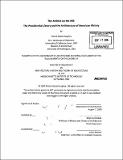| dc.contributor.advisor | Mark Jarzombek. | en_US |
| dc.contributor.author | Haughey, Patrick David | en_US |
| dc.contributor.other | Massachusetts Institute of Technology. Dept. of Architecture. | en_US |
| dc.date.accessioned | 2010-04-28T17:00:12Z | |
| dc.date.available | 2010-04-28T17:00:12Z | |
| dc.date.copyright | 2009 | en_US |
| dc.date.issued | 2009 | en_US |
| dc.identifier.uri | http://hdl.handle.net/1721.1/54551 | |
| dc.description | Thesis (Ph. D.)--Massachusetts Institute of Technology, Dept. of Architecture, 2009. | en_US |
| dc.description | Cataloged from PDF version of thesis. | en_US |
| dc.description | Includes bibliographical references (p. 545-560). | en_US |
| dc.description.abstract | Presidential libraries are not really about presidents. Rather, presidential libraries define publics through the transformation of American history into images and ideas. The presidential library is a uniquely American institution where national history plays out in a mitigated exchange between the representation of memory and the record of political action. On the one hand, the presidential library is a peculiar type of museum and a place of commemoration whose purpose is to perpetuate an often-mythic memory of a singular figure-offering simultaneously the image of an idealized leader and a model for citizenship. On the other hand, its history describes a tenuous accountability between the potentially critical archive and an elusive public. The presidential libraries project a prophecy of historical exceptionalism into the future through the deployment of objects, images, and documents. They reveal how history is used to define American identity, how institutions of stewardship control access and present meaning, and how the contested ownership of history's objects over time transforms ideas of democratic judgment. Therefore, this dissertation examines how the place of the museum and the archive as repositories of national identity, the role of records preservation as a necessary facet of public judgment, and the contentious representations of prophetic heroism in American memory are brought together in the presidential library. | en_US |
| dc.description.abstract | (cont.) From Franklin D. Roosevelt to Richard M. Nixon and beyond, the records and artifacts of presidential intent and institutional practice have been forced over time into an unstable relationship between an obligation to public education as an essential feature of democratic idealism and a belief in the benevolent power of history to hold sway over a singular national future. | en_US |
| dc.description.statementofresponsibility | by Patrick David Haughey. | en_US |
| dc.format.extent | 560 p. | en_US |
| dc.language.iso | eng | en_US |
| dc.publisher | Massachusetts Institute of Technology | en_US |
| dc.rights | M.I.T. theses are protected by
copyright. They may be viewed from this source for any purpose, but
reproduction or distribution in any format is prohibited without written
permission. See provided URL for inquiries about permission. | en_US |
| dc.rights.uri | http://dspace.mit.edu/handle/1721.1/7582 | en_US |
| dc.subject | Architecture. | en_US |
| dc.title | The archive on the hill : the Presidential Library and the architecture of American history | en_US |
| dc.type | Thesis | en_US |
| dc.description.degree | Ph.D. | en_US |
| dc.contributor.department | Massachusetts Institute of Technology. Department of Architecture | |
| dc.identifier.oclc | 566280330 | en_US |
